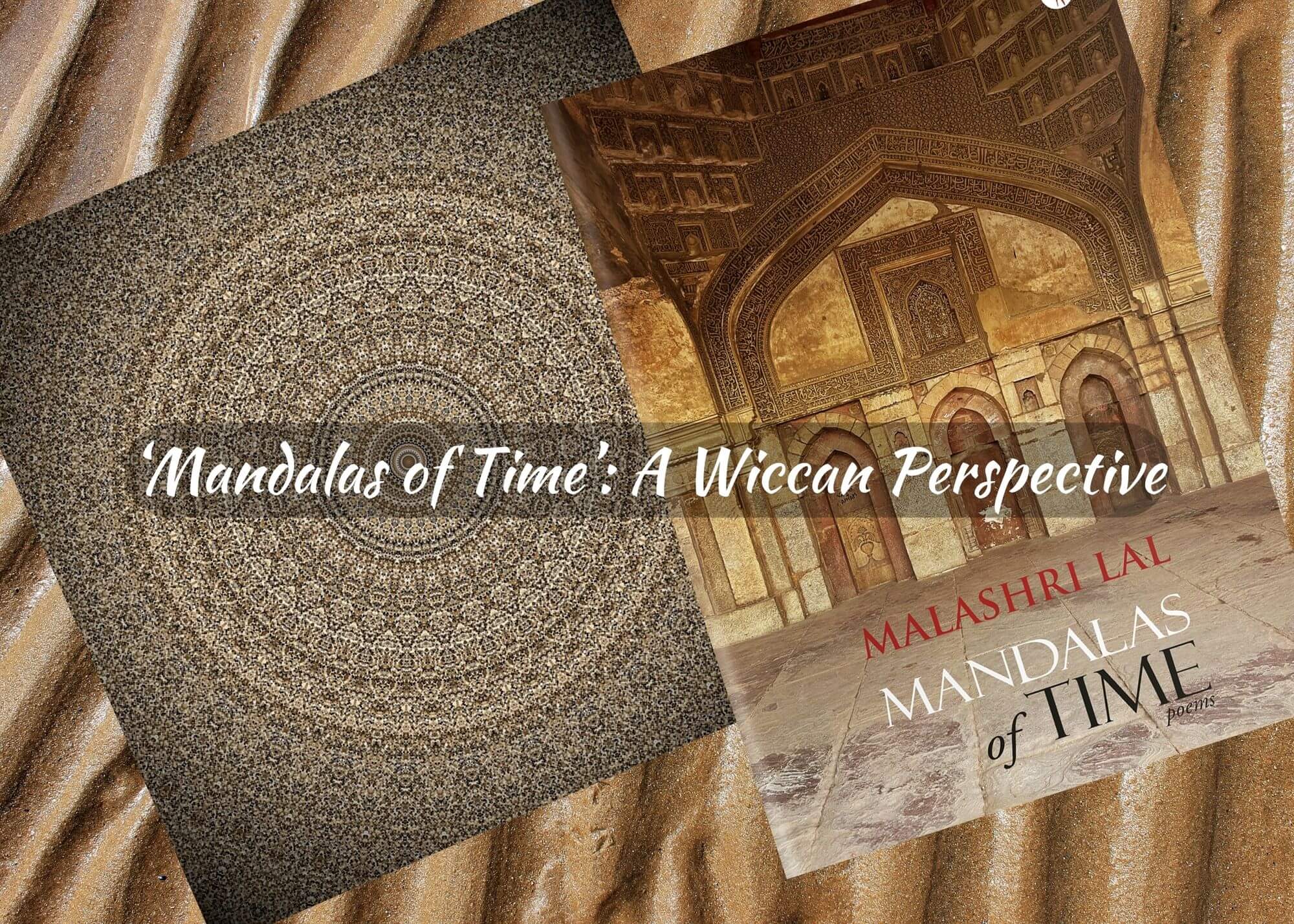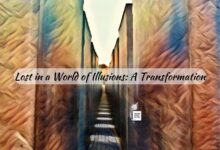The discovery of a “Sand Mandala” in Delhi and Malashri Lal’s “Mandalas of Time” led Rajorshi, a Wiccan to spiritual and mystical dimensions, revealing the mind, body and soul, exclusively for Different Truths.
The word ‘mandala’ has some special significance in my life personally. When I arrived in Delhi for postgraduate studies, I was quite surprised by the local culture. Use of cuss words at the drop of a hat, and many more such things.
In short, Delhi was a culture shock for me. I was a loner and friendless, for the first couple of months or so, before I found someone, a sort of alter ego of mine, sitting in the other corner of the huge gallery. His name was Karma Choeying, a Tibetan student from Dharamshala. We hit it off immediately. He took me to a place called Majnu ka Tilla, where Tibetans stay. He taught me the use of chopsticks with dot pens… But what was interesting was, one day he took me to the India International Centre, where a Tibetan exhibition was on. There he showed me something called a “Sand Mandala ” – coloured sands in circular motifs forming some immensely deep designs. I stood there spellbound for about 20 minutes. I have since lost touch with Karma – Old memories die hard, and ‘Karma’ remains immortal.
The Wiccan in me investigates it with the eye of a wizard/witch (they do exist).
This book has broken and rebuilt a lot of my notions about poets, who are academics. I had always believed (still believe, maybe) that anyone who’s into the ‘department of the language’ that they write in, is so much chained and gripped in their technicalities, that, even if, there are creative juices, they dry up, and the result is, on most occasions, extremely non-poetic (if I may say so). I bought this book at the insistence of a friend, and the bio of the author said, “writer and academic” – scepticism took me over. I am so happy that the poet Malashri is an exception, and her work is exceptional. The Wiccan in me investigates it with the eye of a wizard/witch (they do exist).
Mandalas of Time to me sounds like a portal. A portal, in Wicca, is that thoroughfare that connects this dimension to the other dimensions. Sceptics would liken it to a time machine, but that’s exactly not the case. The portals are potent openings with a visual angle to them. They have a disciplined way of opening and closing. Portals, as a subject, can be discussed later, but this book opens one dimension after another and, on many occasions, shuts them out, leaving the readers to ponder, think, and rethink the depths and shallows of the lines in question.
Being a student of Wicca, I would divide the book into certain sections (read Wiccan philosophical beliefs, the very basic ones) to get a deeper look into the poet’s assertions, negations, and nostalgic innovations.
The Mind
The mind is the rudder that guides you through the purposes of this voyage called life. Though Wicca is a staunch believer in a purpose that we are born for and the destiny that we aim for, the mind plays itself in vivid vibrations to manoeuvre through this entire saga.
This book has a mind of its own and shows the reader directions…
This book has a mind of its own and shows the reader directions, as well as benevolence in the way the book twists and turns itself. In Manthara Dasi, the poet writes:
What wrong did I do in my protecting my child? Doesn't every mother dream of a princess, a queen?
A strong direction is given in fleeting against the wind, to make an earnest effort to break age-old thoughts… It leaves me with a thought: wasn’t Manthara a witch (the wisest of women)? The poet silently whispers, “Yes…” and the devout wiccan in me smiles. Then again, she says,
That too is an illusion In Creation there is only One Ardhanareesvara The God who is both woman and man. Ubiquitous, limitless reminder of equality.
I strongly detest the idea of “what the poet thought in this…”, but in these lines of the opening poem of the book, I would like to know her thoughts; if ever it is possible, I would just love to enquire, whether her thoughts are in sync with mine. From where I see it, the poet speaks of the concentration of unequivocal energies, the light and power of “Brahm”. Something that has no legs, no eyes, no gender, just omnipresence and a discernible mind. The Mind of this book changes and twists directions; it’s fickle at times, stubborn sometimes, but very alert. A thought that the poet wrote in the same book a poem called Go Gently into the Sunset bewildering… Savour these lines:
Prepare to go now With dignity Without regret With grace Without rancour Those who promised but never came Those who came with generous goodwill Who is one's own?
The Body
The body houses the mind and takes care of the physical hits, blows and bruises that come consequently. They act as a cloth or maybe a dress for the inner self and react by smiling, kissing, crying, and, at times, oozing blood to the different signals of the externals. Malashri Lal, in this book, has distinctly created a body—one that hits hard, one that takes blows, one that frowns, one that smiles… The beauty of this collection, perhaps, lies in the way the verses corroborate and at times collaborate, forming at times a distortion and at most other times a pattern or a painting.
The lines in her poem titled Hawa Mahal somewhere reflect the contours of the body of the book:
Cloistered girlhood, Guarded puberty, How did she learn to dream Of love and desire?
The very mention of “desire” here leans towards the eclectic circle (mandala) of the physical being. It reminded me of a yogini chant that we wiccans do, “Omkara Vindum Samyuktam/Nityam Dhayang Yogina/Kamadam Mokshadam Chevo/Omkaraya Namo Namah…”. Thus, for renunciation or attaining the higher plains, Kama (lust or desire) is an absolute necessity. And then she writes in New Born:
And eyes that mirrored mine Across the generation Dark, Quizzical Still trying to fathom the miracle Of birth and rebirth.
These marvellous lines can go through and stand with ease in any wiccan discussion.
These marvellous lines can go through and stand with ease in any wiccan discussion. Here, somehow, the body goes into a jelly-fluid state and tries to demarcate itself as the bearer of the Soul. Since the body forms the majority of what we see, I can name many poems that form the body of this book: Amnesia, The Boat Ride, or even Shyamoli.
The Soul
The soul is the synchronised result of the mind and the body. As and when the mind and the body mingle into an ectoplasmic union, they form ‘you’, the soul, the person who resides inside you. It is the soul that stays on even after the decay and dilapidation of your body. The soul of this book raises its head eloquently and coherently, much to my dismay as a reader. There is a soul in everything; as a true Wiccan will always say, “Nothing in this world is inanimate.” There are subtle souls in books that need to be dug out and, at times, fished out, but in this book, the soul is more than discernible, and if you have missed it at all, you need a serious “soul-searching” to be done inside you. The soul blinks in each of the following lines:
I have decreed as Mother bountiful
you, my foster child, elsewhere born,
look at the old texts on how to divide these uneven pieces,
No bias
No trespass
No waste. "
(Sita's Rasoi)
The heartthrobs, but the soul wobbles.
These lines sketch the very outline of the soul of this book. Dividing the uneven pieces equally makes for serious and more severe introspection. The heartthrobs, but the soul wobbles. I find the soul opening its eyes in these lines. Food binds humans—the basic tenet of life. The poet had worked very deeply into motherhood, keeping the traditions of India in the foyer. The soul evolves more when the poet is caught Waiting for Motherhood, the lines deliver punches that require a sound mind and well-fed body to absorb:
My womb is fecund with life That doesn't in your chart of people Yet my intimate links are there Sharing my blood and my breath My thoughts and my solitude.
And the soul meets the divine and walks through the ramps to be a Spirit in these lines of her poem Song of the Forest:
Its thousand eyes now gazing at the scattered gold And wondering if the syllables were right In the sequence of creation. The moner manush offered no easy answer.
‘Moner manush’ or the soul, the one who stays within you (the real person) is a word from the ‘Baul’ fraternity…
‘Moner manush’ or the soul, the one who stays within you (the real person) is a word from the ‘Baul’ fraternity (ascetics of Bengal in search of their souls) and was very generously used in the writings of Lalon Fakir. Lalon Sai ji as he’s also known, in his writings showed the thousands-year-old way to transform the soul into the spirit. The Wiccan in me can just afford a smile and be in awe of such deeply soulful lines bordering on the ocean of the Spirit.
The spiritual angle to this book can’t be missed right at the beginning.
Finally, I would explore the highest points of this book, where the soul elevates itself to the Spirit. The spirit is seen when the soul matures and raises itself to mingle with the divine energies of the Universe. The spiritual angle to this book can’t be missed right at the beginning. And when a book begins itself at the spiritual level, it is shackled. It’s constrained to lower its height. Poet Malashri Lal has only herself to blame for cruising at such an enormous height throughout the perimeter of her Mandala.
When she says:
The sounds drifted in a swirl of sweetness
Embracing the Pilkhan in ageless understanding
Of human fear.
......
The sweet melody of Krishna's flute floated infinitely
In search of Radha."
(Krishna's Flute).
She delves deep into the acoustic nuances of the depth of each note or maybe the tone of the waves that the flute creates. If music is not a bridge to the divine, what is? She moves on to another myriad mellifluence with Radha’s Flute.
Radha picked the reed but it would Never sing again Loveless, ownerless, Godless.
Radha is a very deep subject, that every student of feminism should go through. The poet touches certain chords(reeds) that spill gallons of juices of every ingredient that a spirit is made up of.
Being a Wiccan, any writing on these lines cannot possibly end without a quote from the Wiccan high priestess, my teacher, and the legendary witch Ma’am Ipsita Roy Chakraverti, she says in The Voice the Priestess, something that goes hand in hand with the ‘spirit’ of this book
To search those beautiful, laughing eyes, to meet them with indifference at last - and to say to them - "I have my strength too. The strength comes because I no longer care." And for a split moment in Infinity as His eyes cloud, to say, "No longer can you sport with me - I begin to understand the intricacies of the maze you have devised”.
With these lines, my teacher nails the book and hails the extreme spiritual competence of the words contained within. Hawakal publishers, having added another peacock plumage on their caps, had helped a wiccan find out another witch, Malashri Lal.
Picture of book cover designed with sand mandala





 By
By

 By
By
 By
By
This is an absolutely brilliant review. I thank the reviewer for delving into the spiritual content of the poems.